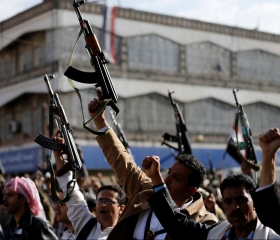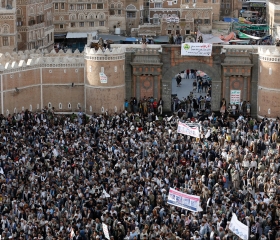The Yemen crisis is hardly a surprise. Riyadh has long been concerned by the rise of Sheikh al-Houthi’s followers, who are widely seen as Iran's proxies in southern Arabian Peninsula. After humiliating defeat in the 2009 border skirmishes, the Saudis even mooted the creation of an exclusion zone costing several billion dollars.
The Saudi response to the Houthi rise was akin to panic, as they rushed to pressure the Arab League into deciding to set up a coalition and launch an air campaign despite the risk that this approach would merely repeat U.S. mistakes in Afghanistan and Iraq. Air raids will hardly thrash the Houthis, while a full-scale land operation is would entail momentous efforts to restore state governance. At the same time, President Abd Rabbuh Mansour Hadi has virtually lost his influence in Yemen's south, the interests of which he had represented before the revolution.
Interestingly, the military bloc was established to face the Houthis rather than the Islamic State in Syria and Iraq, although IS radicals have repeatedly uttered threats against the KSA.
The heart of the matter seems to lie in fear of the Shiite expansion. The Saudis have long been vocal about their concern over the prospects of a Shiite crescent encompassing Iraq, Syria and Lebanon, and Yemen could now become another ally of Iran, completing the encirclement of Saudi Arabia.
Along with the Houthi advance, Riyadh seems fearful of changes in U.S. policy, as Washington is pivoting to the Asia-Pacific and hinting that the Middle Eastern states will have to maintain regional order on their own. If there is a military conflict with Iran, the Americans will hardly leave the KSA to fight it alone, but Riyadh feels less than reassured.
The Saudi elite still seems impressed by the 2011 overthrow of Egyptian president Hosni Mubarak, who was unceremonially dumped by Washington despite their decades-long partnership. And the situation in Egypt went on to deteriorate. First the KSA-hostile Muslim Brotherhood came to power, and then, soon after his election, President Mohammad Morsi visited Tehran for the Nonproliferation Movement summit, and in addition to this, Iranian battleships passed through the Suez Canal.
Since the 1980s Egypt had posed as Saudi's main ally (along with the Gulf states) and one of the guarantors of their continued security. President Mubarak used to say that the security of Egypt and Saudi Arabia was intertwined and that he was ready to extend a helping military hand.
Adjusted by Reality
The Middle East of today lacks a single leader, and is instead fractured between several centers of power, none of which are able to claim regional hegemony and act to stabilize the situation.
Egypt, the former-leader, is still the most populated Arab country boasting the largest and most efficient army, but due to its domestic troubles and a chronic shortage of finances Cairo can no longer afford an active foreign policy.
Saudi Arabia is rolling in cash, but its army and security services are too weak to take up this region-wide responsibility. Besides, the ruling family is deeply mired in a perennial struggle over succession, which effectively overshadows all other activities.
Today the various different sides are trying to create, or rather revive, the tandem of Egyptian soldiers and Saudi money. However, the prospects for this arrangement seem doubtful because there is no truly positive experience of any such alliance. Any united Arab force – as seen in the Arab-Israeli wars, in Lebanon of the 1970s, or during the Kuwait crisis – was dominated by one or two countries, with the other participants a mere formality.
The establishment of a NATO-style bloc by the Arab League also appears highly unlikely, as the group unites more than twenty states with sometimes utterly diverse interests, as the failure to come to a consensus on such a universally important issue as the Israeli conflict clearly demonstrates. Egypt and Jordan signed separate peace treaties, and prefer to keep themselves to themselves.
A union of the likeminded could possibly have been created, as was the mentioned at the Arab Summit in Sharm El-Sheikh. But even the Gulf states failed to establish even a minor military alliance. Their Peninsula Shield Force was of precious little use during Iraqi aggression in Kuwait, and the Gulf monarchies prefer bilateral security arrangements with the United States and West Europeans.
However, Riyadh’s potential allies are emerging among states that need financial assistance or investment. Egypt in particular receives not only direct financial aid but also transmittances from migrants working in the Gulf, and Jordan gets Saudi oil at discount prices.
However, even the Egyptians would be unlikely to commit to more than the air campaign. Cairo is becoming increasingly anxious about neighboring Libya swarming with radical Islamists and that would seem a more likely theater for Egypt’s elite forces, supposedly intended for this future coalition. President Abdel Fattah al-Sisi has already requested the international community sanction a military operation in Libya. Another terrorist threat emanates from Sinai.
Jordan has already burnt its fingers on fighting Islamic State, when King Abdullah II had to helplessly watch the terrorists burning the captured Jordanian pilot alive. Amman is busy protecting its Syria and Iraq borders and is not likely to allocate Yemen with anything more than several battalions.
That would clearly be insufficient. In order to maintain a degree of stability in Iraq, which has a similar population, the United States and its allies had to deploy several hundred troops and lots of military equipment.
All this indicates that, should an Arab contingent finally reach Yemen, it would be in a similar position to the African Union force in Somalia, where it had to hunker down in the capital and concentrate on self-defense.
Since the Saudi Arabia and Riyadh-sponsored Arab coalition is militarily impotent, attempts at armed interference in Yemen appear a gamble that would only aggravate the chaos. It would seem much more expedient to finding a force or a figure able to control the country and provide it with military, financial and diplomatic support. In other words, the current air attacks appear just an attempt to scare the Houthis and make them more accommodating at the talks that are sure to take place sooner or later.
The Oil Factor Remains Irrelevant
Yemen has never been a major oil player, its production dropping to mere 150,000 barrels per day.
However, these fears are mostly related to possible shipping interruption in the Gulf of Aden and the Bab el-Mandeb Strait, the gateway for up to three million barrels of oil daily. Many still remember 2008-2009, when Somali pirates stepped up their raids to push the insurance rates sky high. They even captured tankers laden with Saudi oil, after which an international naval force was sent to the Indian Ocean to resolve the matter.
However, the Houthis refrain from threats of blocking Bab el-Mandeb and would be unlikely to succeed in doing even if they wanted to, because the passage is much wider than the Strait of Hormuz and Yemen has no significant naval force.
A more explicit threat to shipping would only arise if Yemen goes the way of Somalia and becomes a refuge for pirate gangs, although this may also be an exaggeration, because the international force is still in the region and has built up significant experience at restoring order.






